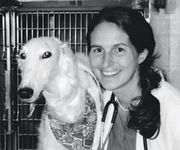Here's to your health
Even veterinarians sometimes overlook the power of the love and support pets provide. But now and then you may get an important reminder that a pet can lend hope and support healing—just as this veterinary student did.
I'll never forget the day I realized the tremendous effect a pet could have on our health; it was a simple, yet defining moment. Four years ago, I was working as a technician at a local clinic while attending the Cornell University College of Veterinary Medicine. I captured my relaxed dedication about becoming a veterinarian perfectly for all to hear on my cell phone's voice mail: "I can't come to the phone right now—I'm probably giving a shot to a goat. Please leave a message, and I'll get back to you."

When working as a technician while attending veterinary school, Annette Otis saw firsthand the incredible support-and health benefits-humans derive from pets.
Sure, I'd read countless articles full of statistics about how owning pets could lower blood pressure, relieve stress, dissolve varicose veins, or cure whatever other malady ails you. But it was all academic pseudoscience to me. I'd owned dogs and cats, and I certainly hadn't felt they'd influenced my physical health one way or another. Such was my mindset until I held Buster's legs during his ultrasound.
A new perspective
Buster was an ugly little dog who looked like a cross between a Welsh corgi and a Shih Tzu, with misaligned teeth that stuck out even when his mouth was closed. His dirty white coat was sparse in areas, his pink skin showing beneath. I wasn't too impressed with the little guy, but I was thankful he at least held still for his ultrasound.
It was the first time I'd seen Buster, but apparently he'd been a long-time patient at the clinic. I remember the doctor's diagnosis—cancer—but I fail to remember where or what kind. Frankly, I wasn't thinking much beyond my immediate task of holding down Buster's legs.
Then I glanced over and glimpsed the owner's face as he processed the upsetting news. Even in the darkness of the ultrasound room, I could see he was an older gentleman, his thin frame stooped over, leaning against his oxygen canister and the table for support.
"That's what I was afraid of," he said. The man wasn't crying, but reading the anguish and terror in his eyes, my own eyes immediately welled up. I can usually hold my composure, but the tears made their way down my face as he continued, "That dog saved my life." I looked over at the veterinarian, who was also struggling to maintain his poise.
"The doctor told me that if I didn't get out and walk everyday, I wouldn't build up my strength, and my emphysema would get the best of me," the man continued. "If it weren't for this little guy needing a walk every day and keeping me going while I was out there, I'd have quit and said to hell with it."
I'd heard the attribution of good health to a pet's love before, but in that moment the relationship these two shared finally hit home. Before I'd thought that people simply needed pets for comfort and a way to spend their time. Looking at this homely dog, so weak his legs didn't actually need to be held, I realized that people also lean on their pets for their own health, much as if the animal were a human friend or family member.
And the effects aren't just physical. True, Buster may have lowered the man's cholesterol and cortisol levels or some other measurable laboratory parameter. More important, he had real influence on his owner's psyche and ability to deal with his own health issues.
A few months later, Buster came in for euthanasia, the cancer finally winning out. I never saw his owner again. But I'll always remember their lesson to me: Although no statistic truly illustrates how the morale and hope derived from a pet helps owners battle illness, pets make a great difference. They can provide simple comfort and just make you laugh; they also can do something as profound as give you a reason to live.
Annette Otis graduates this May from Cornell University College of Veterinary Medicine and will begin an internship at Southpaws Veterinary Referral Center in Fairfax, Va.